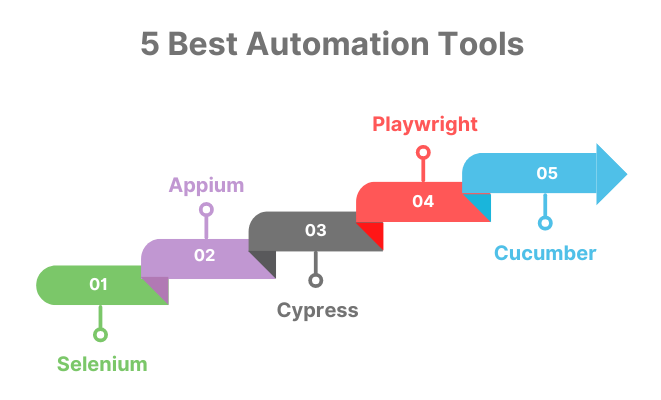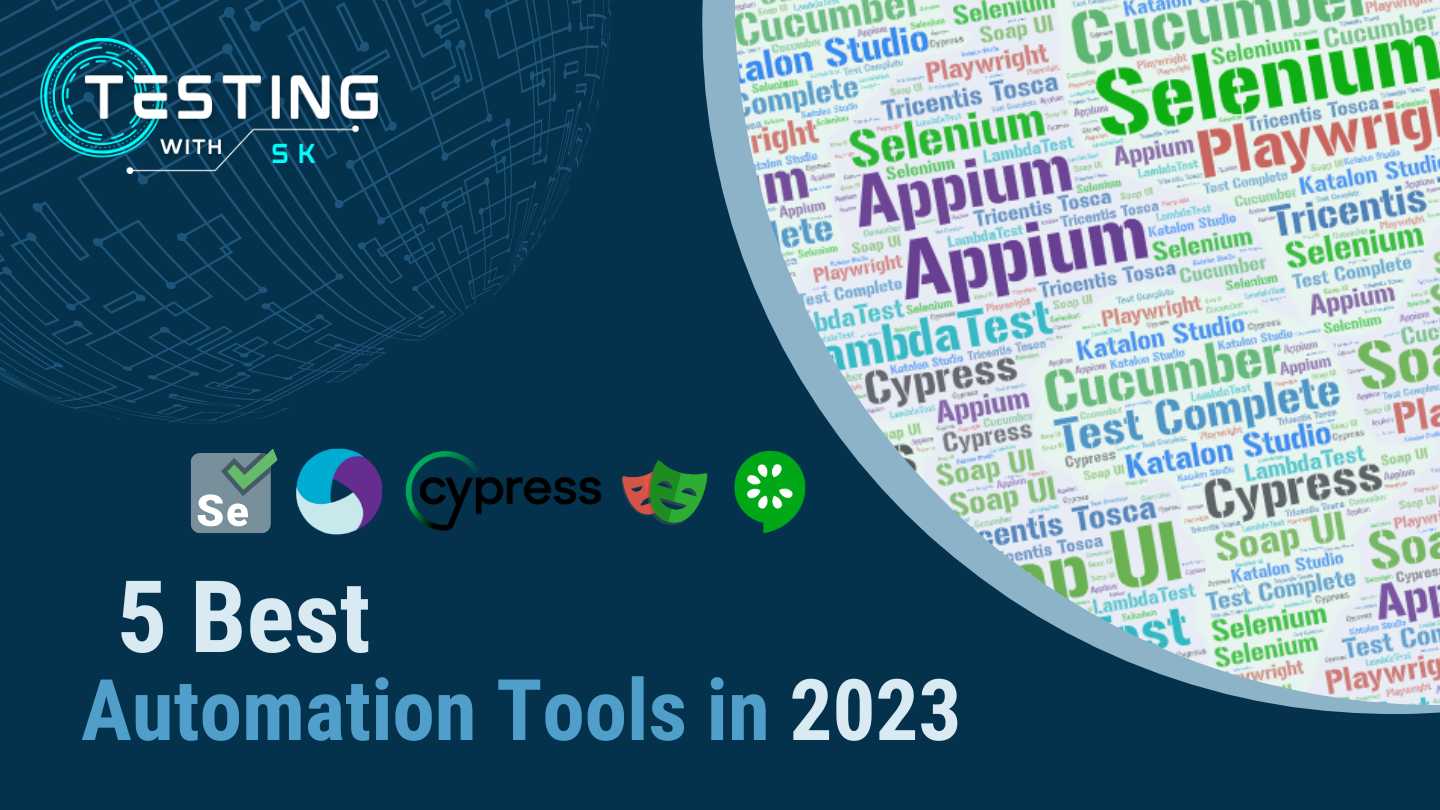With the rise in Mobile Applications and Web Applications, nowadays the software testing fields are changing constantly and the need for automation testing is increasing day by day. We all want to create reliable, maintainable tests for our automation framework.
We make sure that those tests should be maintainable in the long run so that the regular changes can’t break them. Most clients expect much from their testers to design the framework and therefore automation testing tools have become an essential part of the testing field. Automation tools help to reduce the overall time to test the software and also help to eliminate human errors.
Test automation can’t be realized without good tools, as they determine how automation is performed and provides the benefits of automation, and help to deliver the Quality at Speed.
Table of Contents
What is Automation Testing?
Automation Testing is a software testing technique that ensures that it meets the requirements by using special software testing tools. Automated testing saves the tester’s time and money by making the testing process more efficient.
What is Automation Testing Tool?
Automation Testing Tool is an automated framework that performs different types of testing like – Regression Testing, Smoke Testing, Sanity Testing, Functional Testing, and End-to-End Testing. It can be performed on different types of browsers and operating systems. It has the ability to find the bug automatically and report it, as well as during the execution time, along with the screenshots.
Automation Tools supports different browsers, platforms, and programming languages. Using automation tools we can execute our test case parallelly on different browsers.
There are different types of Automation Tools available in the market. Some of them are open-source and free to use. But some tools are paid for use.
In this article, We will see the best automation testing tools, that you can choose based on your needs. Since the list of automation tools is not short. Let’s see the best tools to explore in 2023.

Selenium
Selenium is a very popular, most used, and well-known testing framework. It is specially designed to support automation for web-based applications. Selenium also provides a record and playback tool that doesn’t need any programming skills.
Selenium Tests are written with Web Driver, an implementation of W3C Web Driver specification. It can automate across various operating systems, like Windows, Mac, and Linux, and browsers like Firefox, Chrome, Internet Explorer, and Headless Browsers. It supports multiple programming languages including Java, C#, Python, Ruby, PHP, Perl, JavaScript, etc.
Selenium is not only a single suite but is a suite of software, each of them following a different approach for automation testing. It has four major components which include –
- Selenium Integrated Development Environment (Selenium IDE)
- Selenium Remote Control (Selenium RC) – (Now Deprecated)
- Selenium WebDriver
- Selenium Grid
Pros:
- Selenium needs very less resources in comparison with other manual testing tools.
- Selenium supports parallel execution which increases the efficiency of tests.
- Selenium can be integrated with frameworks like Ant and Maven for code compilation.
- Selenium can be integrated with testing frameworks like JUnit and TestNG.
- Test cases written using this tool can be executed on different systems and browsers.
Cons:
- Selenium doesn’t support automation for desktop applications, images, and captcha.
- Selenium also doesn’t support automation for web services like REST and SOAP.
- Selenium doesn’t provide any built-in reporting capability. For doing so, we need to integrate third-party tools.
- Selenium is not accurate when dealing with dynamic web elements.
- Selenium is not efficient to handle timeouts, waits, sync, and page load issues.
License – Open-Source
Website – https://selenium.dev/
Find more about Selenium – Selenium Articles
Appium
Appium is an open-source, and very popular framework for mobile automation testing. It can automate native apps, hybrid apps, and mobile web apps on iOS and Android. It drives the app using the Web Driver API. Appium supports cross-platform testing as it allows testing the same app on multiple platforms using the same API. It supports automation testing on real devices as well as on emulators or simulators.
Similar to Selenium, It supports multiple programming languages including Java, C#, Python, Ruby, PHP, Perl, JavaScript, etc. Appium is too much similar to Selenium WebDriver. So, if you have enough idea of selenium web driver, Appium will be easy to learn. Appium has no dependency on Mobile device OS because Appium has a framework that converts the selenium commands into UIAutomation(iOS) or UIAutomator(Android) commands according to the device type, not any OS type.
Pros:
- Appium supports different types of programming languages to write automation scripts.
- Appium allows testing in various types of mobile applications (native, web, and hybrid apps).
- Appium does not require any application source code.
- Appium has a strong and active community.
- Appium supports parallel execution which increases the efficiency of tests.
Cons:
- Appium tests depend on the remote web driver, so the execution becomes quite slow.
- Appium uses UIAutomator for Android that supports only Android SDK, API 16, or higher versions. However Appium supports older APIs, but we need another open-source library i.e. Selendroid to support older APIs.
- Appium doesn’t provide any built-in reporting capability. For doing so, we need to integrate third-party tools.
License – Open-Source
Website – https://appium.io/
Cypress
Nowadays, Cypress become very popular for modern web applications. Cypress is next generation front-end testing tool. Cypress is most often compared to Selenium. Cypress is both fundamentally and architecturally different. Cypress is not constrained by the same restrictions as Selenium.
Cypress is a free, open-source testing tool. Cypress has been made specifically for developers and QA engineers, to help them get more done. While using Cypress provides multiple tools within it. There is no need to install different tools or libraries to set up your testing suite.
Cypress tests are only written in JavaScript. Cypress runs much, much faster, It unlocks the ability to do TDD with full end-to-end tests for the very first time. Cypress has been built so that testing and development can happen simultaneously. Cypress does not need any web driver to interact with web browsers.
Pros:
- Time-Travel: Cypress takes the snapshots while running the tests. Hover over the commands, you can see what happened at each step.
- Real-Time Reload: Whenever you make changes in your tests, Cypress automatically reloads and executes.
- Automatic Waiting: You don’t need to add wait or sleep to your tests like Selenium. Cypress automatically waits for the assertions and commands.
- Screenshot and Videos: Cypress allows us to capture screenshots automatically on failure, and also capture the complete videos of your run.
- Supported Browsers: As of now Cypress supports testing on Chrome, Firefox, Edge, Webkit, and Electron.
Cons:
- Cypress doesn’t support testing for multiple tabs.
- Cypress only supports JavaScript for creating its test cases.
- Cypress provides limited support for iFrames.
- Cypress doesn’t support testing on Safari and IE browsers at this moment.
License – Free up to 500 test results per month. See Cypress Pricing Page for more details.
Website – https://www.cypress.io/
Microsoft Playwright
Microsoft Playwright is a newer, open-source, cross-browser end-to-end automation testing library initially developed by Microsoft contributors. It begins with a JavaScript-based library but now expanded its support to Python, Java, .NET, etc.
Playwright is an addition to the Test Automation Framework and has similar syntax to Puppeteer, but it has overcome many limitations present in Puppeteer. Playwright writes powerful, stable automated tests. Playwright tests across all modern browsers like Chrome, Firefox, Safari, Microsoft Edge, and Opera Mini, and It is designed to be a framework that solves the needs of testing for today’s modern web apps.
Pros:
- Multi-Browser and multi-language support.
- Playwright supports parallel tests with multiple browsers.
- Playwright comes with many built-in reporters like – Dot, List, Line, JSON, JUnit, and HTML Report. We can create custom reporters too. It also supports third-party reporters like Allure Report.
- Playwright provides many different debugging options making it developer-friendly.
- Playwright automatically waits for the commands
- Playwright saves the authentication state of the context and reuses it in all the tests.
Cons:
- Playwright is new, and it’s still evolving. Scope for improvement.
- Playwright doesn’t provide support for IE11.
- Playwright doesn’t support Mobile automation for native mobile apps.
License – Open-Source
Website – https://playwright.dev/
Cucumber
Last but not least, Cucumber is a Behavior Driven Development (BDD) automation testing framework. It provides an easy way for everyone to write and execute the test cases. It doesn’t need any technical knowledge.
It works across multiple platforms like Java, JavaScript, .NET, Ruby, and many others platforms. It can be integrated with Cucumber Studio, JIRA, or any other plugin. It helps to generate reports in HTML, JSON, and other formats.
Cucumber explains the behavior of the application which is written in a simple English text using Gherkin Language. It is helpful to involve business stakeholders who can’t easily read code.
License – Open-Source
Website – https://cucumber.io/
Conclusion
In this article, we have discussed the carefully selected best test automation frameworks for 2023. The word “carefully” means, I have tried my best to serve. Since the list of automation tools is not short. Some of them are open-source and free to use. But some tools are paid for use. All the tools listed above are not based on the same principle. Some are best for web application testing, while some are best for mobile app automation. I hope this list is sufficient and will help in your future endeavors.
Useful Resources
FAQs
1. What is a framework?
A framework defines a set of rules or best practices that we can follow in a systematic way to achieve the desired results.
2. What are the advantages of using the Test Automation Framework?
- While using an automation framework, saves money and time, and testing is faster in execution.
- It helps to increase the maximum coverage.
- It enables parallel execution in the combination of different OS and browser environments.
3. What is the main disadvantage of Cypress Framework?
It doesn’t handle multiple tabs automation.
❤ If you found this article useful, do like, comment and support.
Follow us on our social networks –

